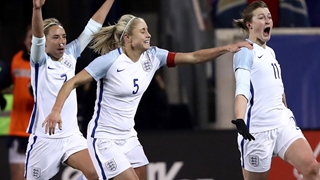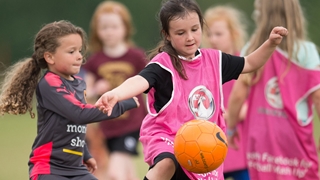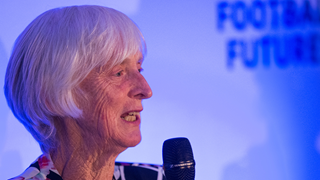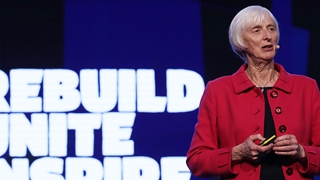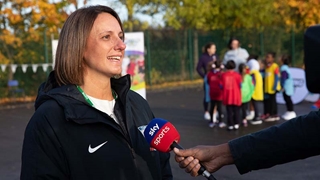
After 17 years at the Youth Sport Trust, I joined the FA in November 2017 with the exciting but slightly daunting ‘double participation of the women’s and girls’ game by doubling the number of affiliated teams by 2020' in my job description.
Being sports mad, still playing netball (having played internationally for England) and having children with a relentless thirst for sport, I know the importance of participation across different age groups and the benefits that formal or informal play can bring. If it's being part of a team or an informal run-around with friends, sport is a fundamental way to enrich life.
Change had to be sustainable, breaking down barriers to encourage new women and girls to play football, whilst retaining and valuing the thousands of existing participants. The plan we built was based around four pillars – places, programmes, people and profile.
If more women and girls are playing the game, then they need places to play. Easy to say but much harder to execute and providing more places to experience football has been our top priority.
Crucially, that has been achieved by building an infrastructure of Wildcats centres for 5 to 11 year old girls and Just Play centres for adults. That infrastructure has been integral to the growth of competitive female teams, from 6000 [the strategy’s baseline] to 9251.
With the inclusion of Wildcats and Just Play centres, that’s over 12,500 affiliated teams, mini-soccer groups and adult recreational groups playing across the breadth of the country, fulfilling our 2020 target to ‘double participation’. The impact that they're all having on physical and mental health and wellbeing and the joy they are bringing to their communities is probably one of our proudest achievements.
Creating innovative programmes that match women and girl's motivations to play has been a gamechanger, ensuring we have got the flexibility for football to be played for competition, fun, excellence or to learn. Wildcats has given nearly 34,000 young girls in 1621 locations across the country the confidence to give football a go for the first time, allowing them to learn new life skills and form new friendships groups in the process. 18,000 primary school girls have enjoyed the FA Shooting Stars inspired by Disney programme over the past two years. Football with a Guardians of the Galaxy or Aladdin theme has given our sport a unique Disney twist and proved popular in the primary school playground.
These achievements are not possible without people, so building a diverse workforce of enablers to grow the game and create female friendly environments has been vital. This year we launched the first Women and Girls Officer Programme, providing professional development to a collective of 78 specialists from CFAs, Club Community Trusts and national organisations.
Over 143 community clubs have received ‘female-friendly’ club training, to help build a genuinely inclusive club environment for women to enjoy. The future of women’s football development is also encouraging, with 37 women’s football apprentices trained over the course of the Gameplan for Growth.
Our plan has needed us to not only build an infrastructure but to increase the profile, changing the perceptions and breaking down the historical barriers that have been detrimental to the women and girls’ game. Avoiding clumsy stereotypes, we have presented the game in a way that it appeals to the female audience.
We've worked to encourage the ‘see it, play it’ mantra across all age groups and formats of the game. This was best demonstrated during the Lionesses’ run to the FIFA Women’s World Cup semi-finals, where women of all ages and abilities were inspired to follow in our Lionesses’ footsteps and get outside and play.
Most pleasingly to me, football for all has been a key mantra for the last three years. Using football as a tool for community integration, we have formed new partnerships with Cerebral Palsy Sport, the Wheelchair Football Association and Amnesty International UK. Alongside a unique partnership with Football Beyond Borders, which has seen young BAME role models encouraging new girls to the game.
Attention now turns to the future, and we’ll be increasing our influence in schools, colleges and universities with national partners, Youth Sport Trust, Association of Colleges and BUCS. More details will be in the newly formed women’s football strategy, which will be launched at the start of the season.
Finally, a big thank you. Thank you to the hundreds and thousands of new participants, whether you have experienced the joys of football in a weekly kickabout with friends in the park, a Saturday morning Wildcats session or with a new team. You're now on a journey which will hopefully see football become a crucial part of your life. For the thousands of participants who have remained with us, thank you for your ongoing enthusiasm and dedication.
Thank you to our partners Disney, Barclays, Snickers, Nike and BT who have supported us. I reserve my biggest thank you to the women’s football workforce and thousands of volunteers, without you we would be staring at empty pitches and unused kit – none of this would be possible.
Find out more on the increase in participation and read case studies across England.
FIND OUT MORE ON HOW YOU CAN GET INVOLVED IN FOOTBALL

